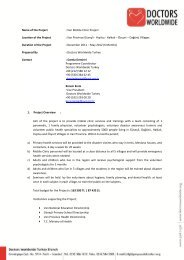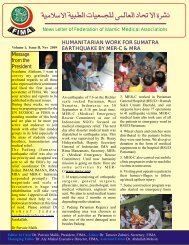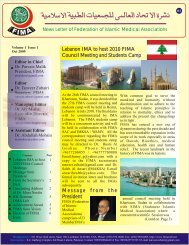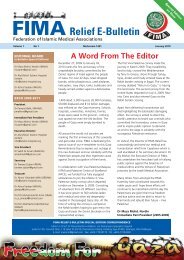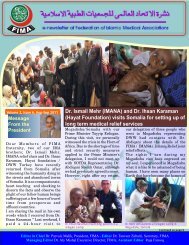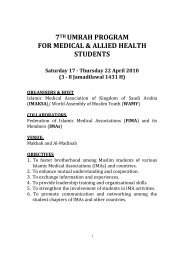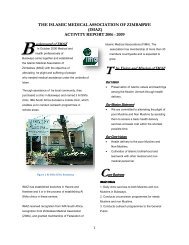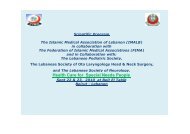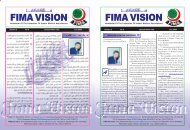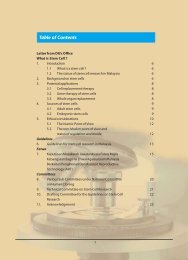FIMA Year Book 2009 - Federation of Islamic Medical Associations
FIMA Year Book 2009 - Federation of Islamic Medical Associations
FIMA Year Book 2009 - Federation of Islamic Medical Associations
Create successful ePaper yourself
Turn your PDF publications into a flip-book with our unique Google optimized e-Paper software.
Ethics <strong>of</strong> Clinical ResearchGuideline 6. Obligations <strong>of</strong> Sponsors/InvestigatorsThis guideline details the duties <strong>of</strong>both the sponsors and investigators togive the subjects accurate informationand neither withhold any informationthat may negatively influence thepotential research subjects’ decision toconsent nor deceive them in any way.They should not include any explicitor implicit threats in their discussionswith the potential subjects. <strong>Islamic</strong>jurisprudence stipulations supportthis guideline. These stipulations are“mutual agreement can not be reachedunder conditions <strong>of</strong> ignorance,” and“consent to an unknown thing andacquittal from an unknown thing arenot valid.” (20)Guideline 7. Inducement to ParticipateThere is no objection, from the <strong>Islamic</strong>point <strong>of</strong> view, to compensate researchsubjects for lost earnings, transportand other expenses that might beincurred as a result <strong>of</strong> participatingin the research. Actually, the rule<strong>of</strong> reparation and the principles <strong>of</strong>justice and fairness make it necessaryto compensate the subjects adequatelyfor what they have paid. Additionalfinancial or in-kind payments made toinduce participation in research mayimply undue inducement. If it pressuresthe subject to give consent not based onconviction, then it is legally prohibited.However, if such payment doesnot influence the subject’s decisionmaking and he gives his consent, withhis free will, his consent in <strong>Islamic</strong>jurisprudence is valid. Neverthelessthere should be – in my view – somerestriction. The additional paymentsgiven to a poor person, or the provisionor even the promise <strong>of</strong> medical care toa person who does not have access tothat care in less developed countriesor uninsured individuals in Westernsocieties, could be a significantinducement that may cloud the ability<strong>of</strong> the person to make a true informeddecision. The person may consentto participate and expose himself tocertain risks he would avoid were he isnot in need <strong>of</strong> such incentives.Guideline 8. Benefits and Risks <strong>of</strong>Study ParticipationThe investigators must ensure thatpotential benefits and risks arereasonably balanced and the risks areminimized. The need to strike a balancebetween potential benefits and risks inresearch involving human subjects,with the prospective benefits beingmore likely and the need to minimizerisks, is included in a basic principle<strong>of</strong> <strong>Islamic</strong> Law, “if a less substantialinstance <strong>of</strong> harm and an outweighingbenefit are in conflict, the harm isforgiven for the sake <strong>of</strong> the benefit.” Ifa benefit and an instance <strong>of</strong> harm are inconflict, priority should be given to theweightier <strong>of</strong> the two. (20)It is acceptable from a religiousperspective to use the expected,significant benefits to society as ajustification <strong>of</strong> the risks interventionspose to an individual who has nopossible direct diagnostic, therapeutic,<strong>FIMA</strong> <strong>Year</strong><strong>Book</strong> <strong>2009</strong>144




